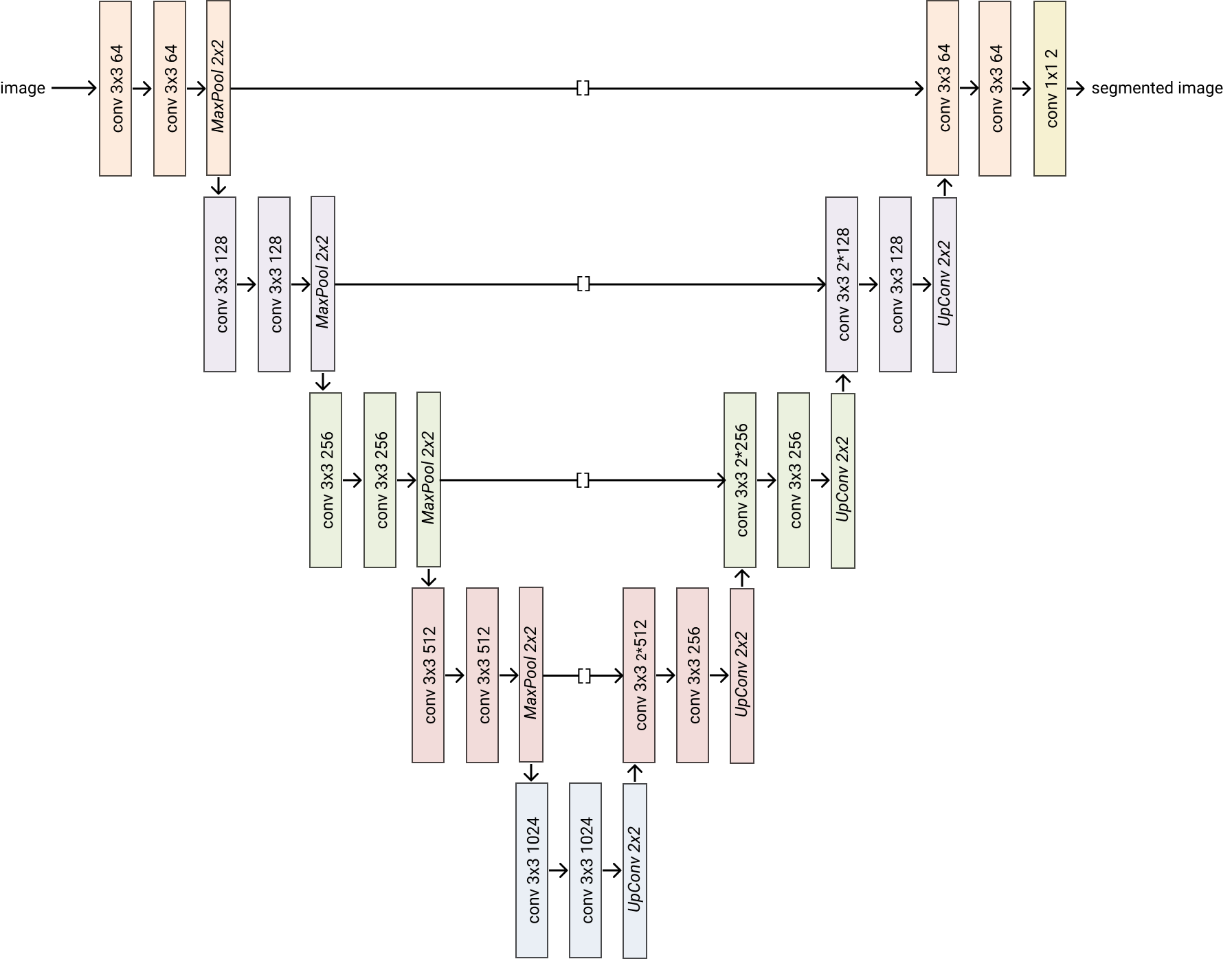glasses.models.segmentation.unet package¶
Module contents¶
- glasses.models.segmentation.unet.DownBlock¶
- class glasses.models.segmentation.unet.DownLayer(in_features: int, out_features: int, donwsample: bool = True, block: torch.nn.modules.module.Module = <class 'glasses.models.segmentation.unet.UNetBasicBlock'>, *args, **kwargs)[source]¶
Bases:
torch.nn.modules.module.ModuleUNet down layer (left side).
- Parameters
out_features (int) – Number of input features
out_features – Number of output features
donwsample (bool, optional) – If true maxpoll will be used to reduce the resolution of the input. Defaults to True.
block (nn.Module, optional) – Block used. Defaults to DownBlock.
Initializes internal Module state, shared by both nn.Module and ScriptModule.
- forward(x: torch.Tensor) torch.Tensor[source]¶
Defines the computation performed at every call.
Should be overridden by all subclasses.
Note
Although the recipe for forward pass needs to be defined within this function, one should call the
Moduleinstance afterwards instead of this since the former takes care of running the registered hooks while the latter silently ignores them.
- training: bool¶
- class glasses.models.segmentation.unet.UNet(in_channels: int = 1, n_classes: int = 2, encoder: glasses.models.base.Encoder = <class 'glasses.models.segmentation.unet.UNetEncoder'>, decoder: torch.nn.modules.module.Module = <class 'glasses.models.segmentation.unet.UNetDecoder'>, **kwargs)[source]¶
Bases:
glasses.models.segmentation.base.SegmentationModuleImplementation of Unet proposed in U-Net: Convolutional Networks for Biomedical Image Segmentation

Examples
Default models
>>> UNet()
You can easily customize your model
>>> # change activation >>> UNet(activation=nn.SELU) >>> # change number of classes (default is 2 ) >>> UNet(n_classes=2) >>> # change encoder >>> unet = UNet(encoder=lambda *args, **kwargs: ResNet.resnet26(*args, **kwargs).encoder,) >>> unet = UNet(encoder=lambda *args, **kwargs: EfficientNet.efficientnet_b2(*args, **kwargs).encoder,) >>> # change decoder >>> UNet(decoder=partial(UNetDecoder, widths=[256, 128, 64, 32, 16])) >>> # pass a different block to decoder >>> UNet(encoder=partial(UNetEncoder, block=SENetBasicBlock)) >>> # all *Decoder class can be directly used >>> unet = UNet(encoder=partial(ResNetEncoder, block=ResNetBottleneckBlock, depths=[2,2,2,2]))
- Parameters
in_channels (int, optional) – [description]. Defaults to 1.
n_classes (int, optional) – [description]. Defaults to 2.
encoder (Encoder, optional) – [description]. Defaults to UNetEncoder.
ecoder (nn.Module, optional) – [description]. Defaults to UNetDecoder.
Initializes internal Module state, shared by both nn.Module and ScriptModule.
- training: bool¶
- class glasses.models.segmentation.unet.UNetBasicBlock(in_features: int, out_features: int, activation: torch.nn.modules.module.Module = functools.partial(<class 'torch.nn.modules.activation.ReLU'>, inplace=True), *args, **kwargs)[source]¶
Bases:
torch.nn.modules.container.SequentialBasic Block for UNet. It is composed by a double 3x3 conv.
Initializes internal Module state, shared by both nn.Module and ScriptModule.
- class glasses.models.segmentation.unet.UNetDecoder(start_features: int = 512, widths: List[int] = [256, 128, 64, 32], lateral_widths: Optional[List[int]] = None, *args, **kwargs)[source]¶
Bases:
torch.nn.modules.module.ModuleUNet Decoder composed of several layer of upsampling layers aimed to decrease the features space and increase the resolution.
Initializes internal Module state, shared by both nn.Module and ScriptModule.
- forward(x: torch.Tensor, residuals: List[torch.Tensor]) torch.Tensor[source]¶
Defines the computation performed at every call.
Should be overridden by all subclasses.
Note
Although the recipe for forward pass needs to be defined within this function, one should call the
Moduleinstance afterwards instead of this since the former takes care of running the registered hooks while the latter silently ignores them.
- training: bool¶
- class glasses.models.segmentation.unet.UNetEncoder(in_channels: int, widths: List[int] = [64, 128, 256, 512, 1024], *args, **kwargs)[source]¶
Bases:
glasses.models.base.EncoderUNet Encoder composed of several layers of convolutions aimed to increased the features space and decrease the resolution.
Initializes internal Module state, shared by both nn.Module and ScriptModule.
- forward(x: torch.Tensor) torch.Tensor[source]¶
Defines the computation performed at every call.
Should be overridden by all subclasses.
Note
Although the recipe for forward pass needs to be defined within this function, one should call the
Moduleinstance afterwards instead of this since the former takes care of running the registered hooks while the latter silently ignores them.
- training: bool¶
- glasses.models.segmentation.unet.UpBlock¶
- class glasses.models.segmentation.unet.UpLayer(in_features: int, out_features: int, lateral_features: Optional[int] = None, block: torch.nn.modules.module.Module = <class 'glasses.models.segmentation.unet.UNetBasicBlock'>, *args, **kwargs)[source]¶
Bases:
torch.nn.modules.module.ModuleUNet up layer (right side).
- Parameters
out_features (int) – Number of input features
out_features – Number of output features
block (nn.Module, optional) – Block used. Defaults to UpBlock.
Initializes internal Module state, shared by both nn.Module and ScriptModule.
- forward(x: torch.Tensor, res: torch.Tensor) torch.Tensor[source]¶
Defines the computation performed at every call.
Should be overridden by all subclasses.
Note
Although the recipe for forward pass needs to be defined within this function, one should call the
Moduleinstance afterwards instead of this since the former takes care of running the registered hooks while the latter silently ignores them.
- training: bool¶